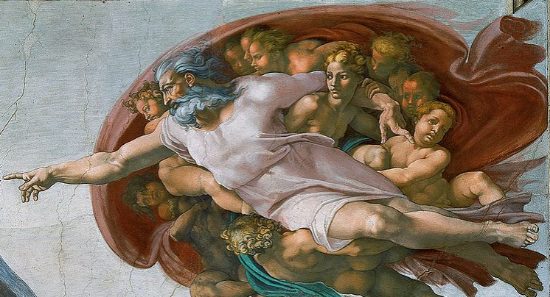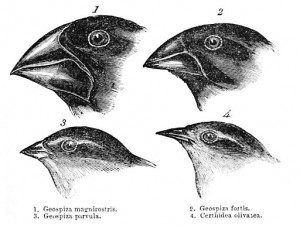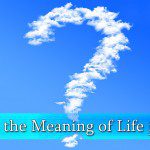
After the publication of On the Origin of Species, religious naturalists found themselves in a pickle. The tide of scientific thought had turned heavily toward evolution, with its wealth of compelling evidence. Yet natural selection was anathema to the devout. Random variation? Survival of the fittest? Where did God fit in when it was every species for itself, with no benevolent Creator as a guiding force?
Thus was born theistic evolution, a school of thought that seemingly died at the end of the 19th century, only to be revived in the modern era by such scientists as Francis Collins. We are still living with the legacy of what was intended by well-meaning believers as a means to reconcile evolution with their deeply held religious beliefs.
Creationists and IDers, too, have picked up many anti-Darwinian arguments from 19th century theistic evolutionists in order to falsify the very existence of evolution. The complexity of the eye is frequently cited. How could part of an eye see? Well, it works pretty well for sea anemones, thank you very much.
Yet theistic evolutionists were attempting to do the exact opposite. It wasn’t about disproving evolution, but clearing a space for God’s involvement in the evolutionary process. (You’re eyes are probably doing a pirouette right now, but bear with me here.)
Deism played a crucial role in freeing science from filing every unknown blank with…and then there was a miracle, as I’ve written about in part one and part two of this series on religion’s role in the evolution of evolutionary thought. For deists, God set the laws of nature in motion, then went off on a package tour of the universe. Even non-deists adopted deistic views of nature’s laws. It became uncool to plug the supernatural into scientific theories. Still, for many, natural selection was uncomfortably close to admitting that there was no need for God at all.
No duh.
By the end of the century, theories that were once condemned as atheistic became a fallback position for those fighting to maintain a role for God in the guiding of evolution. The supposed perfection of design was no longer a defensible argument for the hand of God (though it’s still popular with the intelligent design crowd). Instead, theistic evolutionary theories looked to regular patterns of evolution. Surely it wasn’t a coincidence that the eye of cephalopods so resembled that of humans.
Convergent evolution, anyone? But it’s unfair for me to judge 19th century thinkers with the snark of hindsight just because they didn’t understand what we know now.
Theistic evolutionists attempted to carve out an evolutionary compromise they could feel comfortable with. Yes, according to a modern mindset, this wasn’t good science. Indeed, even among their contemporaries, that became the prevailing attitude, sounding the death knell for their movement. But you have to spare a little sympathy for people honestly grasping at ways to preserve their personal beliefs while still maintaining their scientific integrity.
Their path was paved by Lamarckism. Surely use-inheritance would allow God to build a mechanism for progressive evolution into species without direct intervention. And didn’t the fossil record seem to suggest a linear progression like you would expect with Lamarckism? It certainly seemed to for most paleontologists of the time.
Another competing theory of evolution, orthogenesis, was also favored by those who sought a roll for God in the evolutionary process. Orthogenesis postulated an internal drive or vital force that drew organisms inexorably toward a particular goal, much like the siren call of a bakery window when you’re on a diet.

As I mentioned in The Abuse of Use and Disuse, On the Origin of Species became increasingly Lamarckian in its later editions. But that had more to do with Darwin searching for a mechanism of heredity, in those pre-Mendelian days.
Darwin fervently believed in the natural part of natural selection. But for others, Lamarckism was a grasp for a God-friendly, yet still essentially mechanistic, theory of evolution. Though Lamarckism was less directed than orthogenesis, both theories permitted God to be ultimately in the driver seat. For many naturalists, selectionism was far too materialistic for them to embrace.
The fact of the matter is that creationists are right about one thing—shh, don’t tell them—evolution does indeed lead to atheism. Without Darwinism, there would be no atheist movement today. Indeed, it led Darwin himself to nonbelief. If life could evolve from a single-celled organism into a human being, what do you need a creator-god for?
Yet for the Francis Collins’s of the world, who can’t let go of their faith, they have to compartmentalize their beliefs from the scientific evidence they know to be true. You would think their brains would go kablooey like the computers in Star Trek when fed contradictory information. Does not compute! Does not compute!
But I prefer this kind of psychological legerdemain to the ignorance, misinformation, and outright lies doled out by creationists and its ID offshoot. I’ve read the assertion that all the human fossils found could fit on the top of a piano. The famous Australopithecus afarensis, Lucy, could do that on her own. 19th century theistic evolutionists were earnestly trying to come up with evolutionary mechanisms compatible with their faith. Present day creationists distort scientific evidence to disprove the very existence of evolution.
Francis Collins has been drawing up a 21st century version of theistic evolution called BioLogos. While his quest is surely quixotic, his neo-theistic evolutionism is a sign of how far we’ve come. I look at this as another step in a long process that began when natural philosophers began postulating theories without recourse to divine providence, often thanks to our friends the deists. We’re not there yet, but remember that it has only been a century and a half plus since On the Origin of Species was published.
According to a 1998 study by Edward J. Larson and Larry Witham:
Disbelief in God and immortality among NAS [National Academy of Sciences]biological scientists was 65.2% and 69.0%, respectively, and among NAS physical scientists it was 79.0% and 76.3%. Most of the rest were agnostics on both issues, with few believers.
They were replicating a famous 1933 study by atheist James H. Leuba, who expected that the already high proportion of disbelief or doubt among top scientists his study revealed—70%—would further grow as time went on. That’s exactly what they found.
You might fairly accuse me of cherry picking (there are a number of issues regarding these surveys I plan to delve into in a future post). But Larson and Witham’s results were far more in line with my expectations than the 2007 Rice University study I cited in my last post. In that study, 41% of biologists proclaimed a belief in God.
A 1991 Gallup poll of scientists aligned closely with the Rice University findings, but it didn’t break down scientists by field. Is it a coincidence that the handful of creationist scientists all come from fields that don’t touch on biology or deep time? A chemist and a biologist are not equivalent when it comes to attitudes about a creator-god; the Larson and Witham survey drew from scientists in the natural science fields (as well as mathematics).
Atheists can’t do anything about the latent longing for God in some scientists. But just as organisms evolve, so do cultures. And God has been fighting a rearguard action in science since 1859.















